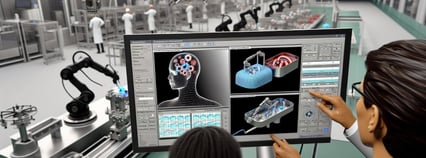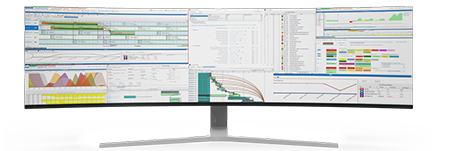Advanced Simulation Techniques for Process Optimization
Purchasing Managers in medical manufacturing facilities play a crucial role in ensuring that the procurement process runs seamlessly, supporting the production of life-saving medical devices and pharmaceuticals. One way to enhance efficiency and optimize processes in this industry is through the use of advanced simulation techniques.
In this blog, we will explore how integrating PlanetTogether with popular Enterprise Resource Planning (ERP), Supply Chain Management (SCM), and Manufacturing Execution Systems (MES) like SAP, Oracle, Microsoft, Kinaxis, and Aveva can revolutionize process optimization in medical manufacturing.

The Challenge of Medical Manufacturing
Medical manufacturing is a highly regulated industry with stringent quality control requirements. It involves the production of medical devices, pharmaceuticals, and other healthcare-related products. Manufacturers in this industry face various challenges, such as:
Compliance and Quality Control: Strict regulatory standards like FDA (Food and Drug Administration) requirements demand meticulous compliance and rigorous quality control to ensure the safety and efficacy of products.
Supply Chain Complexity: Managing the supply chain for medical manufacturing can be intricate, with various components and materials sourced globally. This complexity can lead to delays and inefficiencies.
High Precision and Accuracy: Medical products require the utmost precision and accuracy, leaving no room for errors in manufacturing processes.
Demand Variability: The demand for medical products can fluctuate unpredictably, making it challenging to maintain efficient production schedules.
Resource Optimization: Efficient utilization of resources, including labor, materials, and equipment, is essential to control costs and meet production goals.
To address these challenges, medical manufacturing facilities need advanced tools and techniques that can optimize processes while maintaining compliance and quality standards. This is where advanced simulation techniques come into play.

Advanced Simulation Techniques for Process Optimization
Simulation techniques have been widely used in various industries to model and analyze complex processes. In medical manufacturing, these techniques can provide valuable insights and help optimize various aspects of the production process. Let's explore some of the advanced simulation techniques and their benefits:
Process Modeling and Visualization
Simulation software allows medical manufacturing facilities to create detailed process models. These models can visually represent the entire manufacturing process, including the flow of materials, equipment utilization, and workforce allocation. Purchasing Managers can use these visualizations to identify bottlenecks, inefficiencies, and opportunities for improvement.
Predictive Analytics
Integration with ERP, SCM, and MES systems enables real-time data integration into the simulation software. This data can be used for predictive analytics, allowing Purchasing Managers to anticipate demand fluctuations and make informed decisions regarding procurement and inventory management.
Optimization Algorithms
Advanced simulation tools can apply optimization algorithms to find the best solutions for complex manufacturing challenges. For example, they can optimize production schedules to minimize lead times, reduce costs, and ensure compliance with quality standards.
Scenario Analysis
Simulation software allows for scenario analysis, where different production scenarios can be tested virtually before implementation. This helps Purchasing Managers evaluate the impact of various decisions on the overall manufacturing process, enabling risk mitigation and better decision-making.
Resource Allocation
Efficient resource allocation is critical in medical manufacturing. Simulation techniques can help optimize the allocation of labor, materials, and equipment to maximize productivity while minimizing waste.
![]()

Integration with ERP, SCM, and MES Systems
To harness the full potential of advanced simulation techniques, medical manufacturing facilities can benefit greatly from integrating simulation software like PlanetTogether with their existing ERP, SCM, and MES systems. Let's explore how integration with popular systems like SAP, Oracle, Microsoft, Kinaxis, Aveva, and others can enhance process optimization:
Real-Time Data Exchange
Integration enables seamless real-time data exchange between simulation software and ERP, SCM, and MES systems. This ensures that simulation models are based on the most up-to-date information, improving the accuracy of predictions and optimization.
Streamlined Procurement
Purchasing Managers can use integrated systems to streamline the procurement process. Real-time data from ERP and SCM systems can be used to optimize procurement decisions, ensuring that materials are sourced efficiently and cost-effectively.
Inventory Management
Integration with ERP systems allows for better inventory management. Simulation software can help optimize inventory levels by considering demand patterns, lead times, and storage costs, ultimately reducing carrying costs while ensuring product availability.
Production Planning and Scheduling
Integrated MES systems provide real-time information on machine availability and production progress. Simulation software can use this data to optimize production schedules, reducing downtime and increasing throughput.
Quality Control
Simulation techniques can also be applied to quality control processes. Integration with ERP systems allows for the modeling of quality control checkpoints and ensures that products meet regulatory standards.
In the world of medical manufacturing, process optimization is not just a luxury; it's a must. Advanced simulation techniques offer Purchasing Managers the tools they need to address the complex challenges of the industry while maintaining compliance and quality standards. Integration with ERP, SCM, and MES systems further enhances the effectiveness of these techniques, allowing for real-time data-driven decision-making.
As a Purchasing Manager in a medical manufacturing facility, embracing advanced simulation techniques and integration with systems like PlanetTogether can pave the way for improved efficiency, cost reduction, and ultimately, the production of high-quality, life-saving medical products. In a rapidly evolving industry, staying ahead of the curve is not an option; it's a requirement for success.
Are you ready to take your manufacturing operations to the next level? Contact us today to learn more about how PlanetTogether can help you achieve your goals and drive success in your industry.
Topics: PlanetTogether Software, Integrating PlanetTogether, Real-Time Data Exchange, Streamlined Procurement, Better Inventory Management, Enhance Quality Control, Medical Manufacturing




















LEAVE A COMMENT